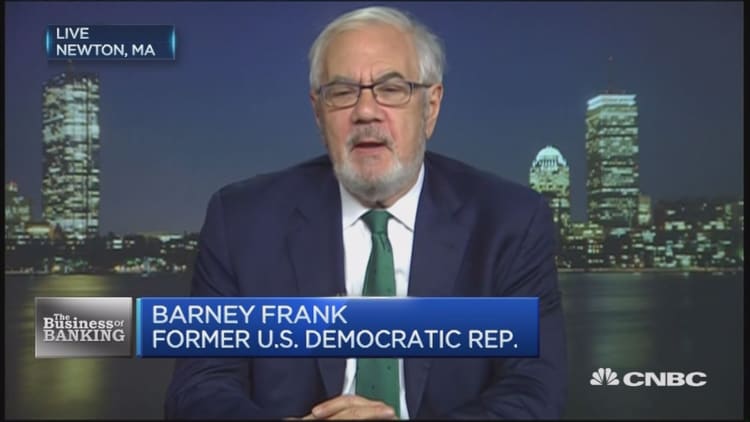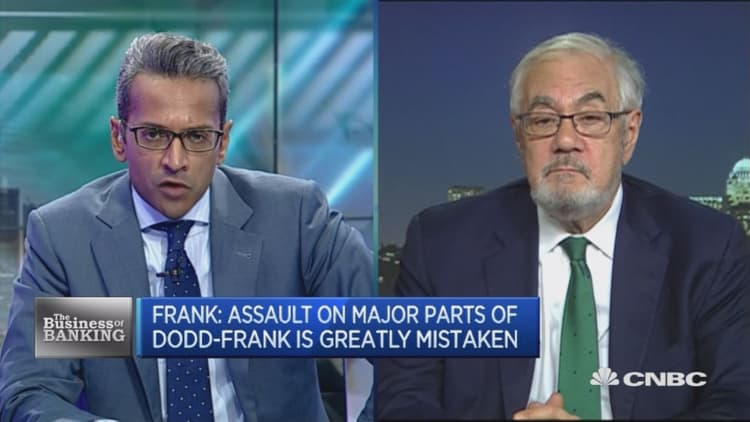
Some regulations in the Dodd-Frank act should be changed, but don't kill the law, which was enacted to prevent the abuses that lead to the Great Recession, one of the regulation's architects told CNBC on Monday.
The Dodd-Frank Wall Street Reform and Consumer Protection Act are now under threat by a Republican-controlled government.
"Yes, there are a couple of particular things where we could tighten it up, but the assault on the major set of plans is greatly mistaken," former Rep. Barney Frank, D-Mass., said on "Squawk Box Asia."
In an interview later on "Squawk on the Street," Frank said President Donald Trump's attacks on the banking law are "not personal at all."
"I don't feel any more strongly about this than I would about other important things that were done. This is a matter of public policy," he said.
Despite having his name on the regulations — alongside former Sen. Christopher J. Dodd, D-Conn. — Frank said there are some improvements to be made, including that the $50 billion asset threshold that identifies U.S. banks as too big to fail was too low. Already, a relatively small number of banks fit the criteria that subject them to more stringent supervision. The top 10 U.S. banks are subjected to stricter rules reserved for banks with assets above $250 billion.
Frank also said reforms were needed to help banks with assets under $10 billion from overspending on compliance for the same provisions faced by the bigger banks.
"Any comprehensive legislation needs some changes," said Frank. "If the Republicans hadn't taken over the House in 2011, with an avowed purpose to get rid of the whole thing, we would have made the changes."
But changes to the existing regulatory framework may end up being much broader in scope.
On Friday, President Donald Trump signed an executive order, directing the Treasury secretary to submit recommendations within 120 days for changes to the financial system regulations enacted under the 2010 law.
The Trump administration also indicated it is looking at revising a separate fiduciary rule that mandates investment advisors to act in the interest of their clients.

Dodd-Frank is a massive set of rules that prevent banks from engaging in certain speculative investments with their own money and requires them to have higher capital levels.
Dodd-Frank also established the Consumer Financial Protection Bureau that protects consumers against risky practices by banks.
Critics of Dodd-Frank said the stringent rules discouraged lending and burdened smaller banks unnecessarily.
Frank agreed in part with the latter criticism, but insisted the bulk of the regulation was against negative practices carried out by financial institutions — such as making loans to mortgage holders without checking their ability to pay back. It was not about lending, he said, adding there was little economic evidence that loans were withheld.
"This was not a decision by a group of politicians to make it harder to run the banks. ... This was a response to a pattern of irresponsibility and error," said Frank.
Details of the changes are not yet known, but experts speculate they could involve ways to get banks to lend more to consumers. It is likely that any sweeping changes would need approval from the Senate.
— CNBC's Jeff Cox contributed to this report.
— Follow CNBC International on Twitter and Facebook.
Correction: This story was revised to correct that the fiduciary rule to ensure that financial advisors act in their customers' best interest was separate from the 2010 Dodd-Frank Act.


